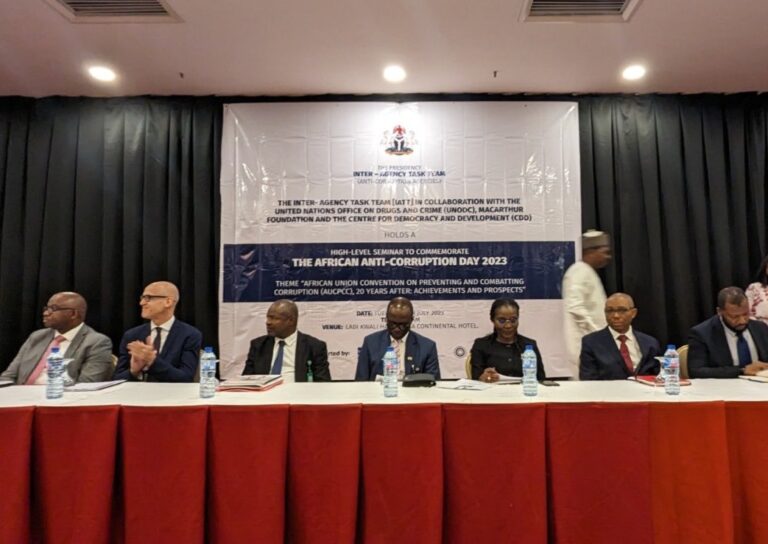News
Nigeria setting standards for using data in anti-corruption reforms – Stakeholders

Stakeholders in anti-corruption fight have lauded Nigeria for setting standards in the use of data for anti-corruption reforms.
The stakeholders said this when they spoke at the 2023 African Anti-corruption Day with the theme “African Union Convention on Preventing and Combating Corruption (AUCPCC),20 years after: Achievement and prospects” on Tuesday in Abuja.
Dr Oliver Stolpe, the Resident Representative of the United Nations Office on Drugs and Crime (UNODC), said that data was critical in the fight against corruption and Nigeria was leading in that aspect.
Stolpe said that standards were being set of countries collating data on progress in implementation and to use that data to then inform further action further anti-corruption reforms.
“Nigeria again is a trail blazer in that regards ,Nigeria is a very active participant in the UN Convention Against Corruption Mechanism 2014 and 2019.
“Nigeria uniquely started the process stock taking, looking at the group reviews conducted and followed up action.
“More importantly, we are actually impressed by the fact that Nigeria as the only country so far actually took that action for itself to see the extend to which it had implemented the various recommendations.
“One of the areas where Nigeria is setting standard in terms of use of data to inform anti-corruption reforms is around the conduct of the National Corruption Survey there were two conducted by the National Bureau of Statistics in 2016 and 2019 which we provided support”, he said.
He said that the process for the conduct of a third national corruption survey was ongoing.
Mrs Jane Onwumere Head Technical Unit on Govenace and Anti-corruption Reforms (TUGAR) said that the African Union Convention on Preventing and Combatting Corruption( AUCPCC), was adopted in Mozambique in 2003 and since then, African Union Member States had made significant efforts in the fight against corruption.
Onwumere said that these included the establishment of National Laws and the creation of anti-corruption agencies.
She said that in order to raise awareness on the negative effects of corruption on diverse aspects of lives and the need to prevent and curb corruption to the barest minimum, the African Union designated July 11 as the African Anti-corruption Day.
“This year represents two decades of implementation of the AUCPCC which is why the theme is the African Union Convention on Preventing and Combatting Corruption 20 Years After: Achievements and Prospects.
“This event comes at an auspicious time as we are undergoing the review of implementation of the AUCPCC after having gone through two cycles of review of our implementation of the United Nations Convention Against Corruption, the UNCAC.
“This gives us an opportunity to evaluate our level of implementation of the Convention, our successes, challenges and lessons learned to determine what more needs to be done locally on one hand, and what other Member States need to jointly address, for better cooperation.”
Onwumere said that the event also sought to assess the level of implementation of the Common African Position on Asset Recovery, the CAPAR presented by Nigeria and unanimously adopted at the 33rd Ordinary Assembly of the African Union.
She therefore, urged stakeholders to recommit to collective action preventing and addressing corruption from the roots as it reflected on the initiatives put in place, the challenges and proffer recommendations to ensure that corruption is fought to the barest minimum,” she said
The Director, Centre for Democracy and Development(CDD-West Africa),
Ms Idayat Hassan reiterated the Centre’s commitment to support anti-corruption fight in Nigeria.
Hassan, represented by CDD’s Research Analyst, Mr Afolabi Adekaiyoja, said the commitment was in areas of addressing bribery, political embezzlement, theft, fraud, gratifications, extortion and blackmail, abuse of office, favoritism, nepotism, and clientelism.
She encouraged anti-corruption agencies across the continent to scale up on illicit asset recovery as there was still much more, domestically and internationally, to be traced and recovered.
“Fighting corruption requires consistent and sustained work on various fronts and adopting innovative strategies to meet the ever-expanding corruption typologies and taxonomies.
“The dangers of relapsing or losing the gains made are high if states do not work concertedly and persistently to sustain the fight.
“The Africa we want can only be achieved through the diligent implementation of the provisions of AUCPCC and state parties renewing their unalloyed commitments to it.”
Hassan also urged them to intensify awareness and visibility programs and push state parties to strengthen implementation and adoption of effective strategies against corruption.
She called on African countries such as Central African Republic, Cape Verde, Djibouti, Eritrea, Eswatini, Somalia, and South Sudan to embrace the initiative.




 Davido's Net Worth & Lifestyle
Davido's Net Worth & Lifestyle 
